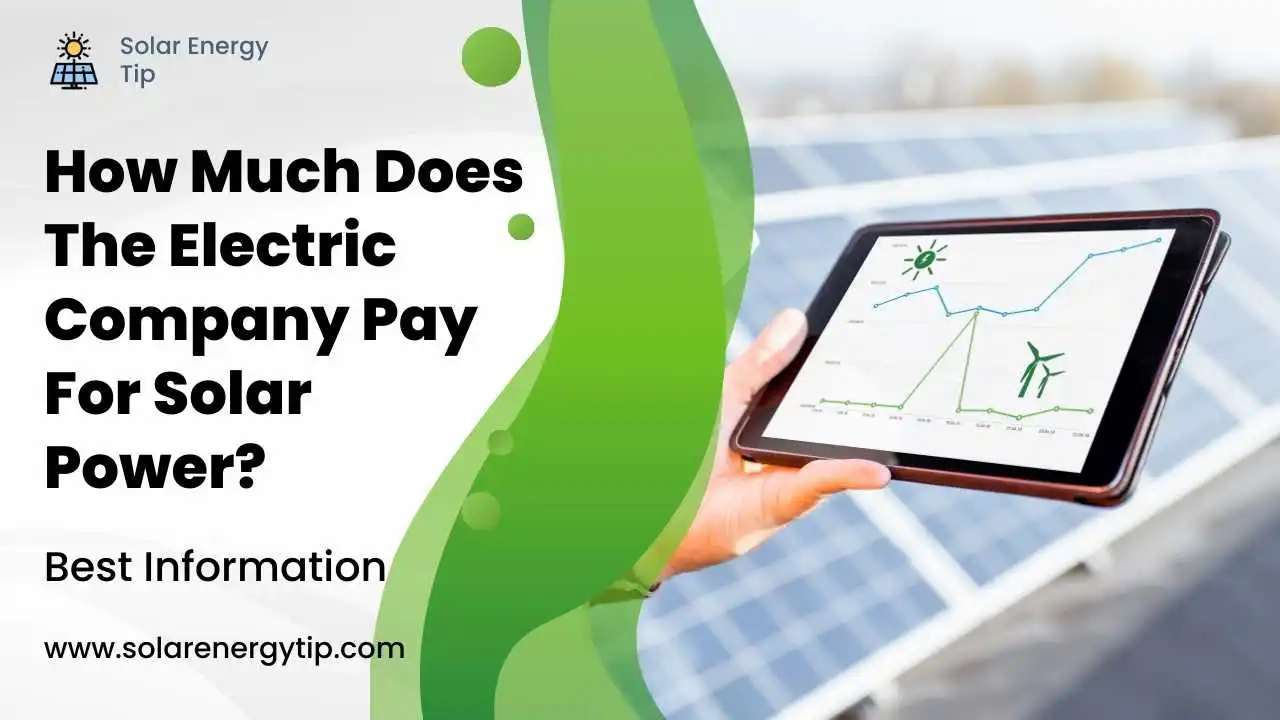Have you installed or are about to install solar panels in your home or office? So you are feeling good about your decision.
Along with that, you need to know how much does the electric company pay for solar power.
You are moving towards environmentally friendly and renewable energy by using solar energy to get electricity.
Solar panels are costly and effective and are officially good at installation. You are using them, so you are confident that you can save money on your energy costs after years.
You can sell this electrical energy generated by solar panels to your electric company to offset your bill or get your credit.
But if we tell you about a bonus here, you may not know you can benefit from a solar tax credit. In our article, we will also get information about the Solar Tax Credit.
I have tried to answer your question through my research, and I request you to read and comment on this answer till the end.
- If You Have Solar Panels, Does the Electric Company Pay You?
- How Much Does the Electric Company Pay for Solar Power? Some Ideas
- Electric Company Pay For Solar Power – Some Points
- Net Metering Solar System
- Calculating The Compensation
- Can You Sell Solar Energy Back to The Power Company?
- Does the Electric Company Pay You For Solar Energy?
- How to Read Electric Bills With Solar
- Electric Bill After Solar Panels
- Solar Tax Credit
- FAQs
- Conclusion
If You Have Solar Panels, Does the Electric Company Pay You?
If you’ve got solar panels on your house, the electric company will usually give you credits for any extra electricity you make and return to the grid.
So when your panels aren’t cranking out as much juice, those credits help lower your bill.
How it works depends on what state you live in and who your utility is, but that’s the gist.
How Much Does the Electric Company Pay for Solar Power? Some Ideas
Electric utility companies worldwide pay differently for electricity generated by solar panels in their area of residence or business place.
This article has learned how electric utility companies in the United States pay for electricity generated by solar power.
A typical U.S. household consumes approximately 10,766 kilowatt-hours (kWh) of electricity annually.
Many electric companies can apply a credit to your monthly bill if you are generating more electricity than you use in your solar panels in your home or business space.
The monthly basis will affect how much the electric company pays for solar power.
For example, the current up-rate for November is $.03988 (.40 cents) per kilowatt. If you sell this electricity back to SDGE, they will credit you to your account at .40 cents a kilowatt.
Then, if you sell your 100-kilowatt solar power to an electric utility company, you will be credited up to 40 dollars, in your next electric bill.
That’s why your electric utility companies have different guidelines and things to note, the most important of which is where you live.
Other than that, it is said that net metering is already beneficial to you, which can be a bonus.
Electric Company Pay For Solar Power – Some Points
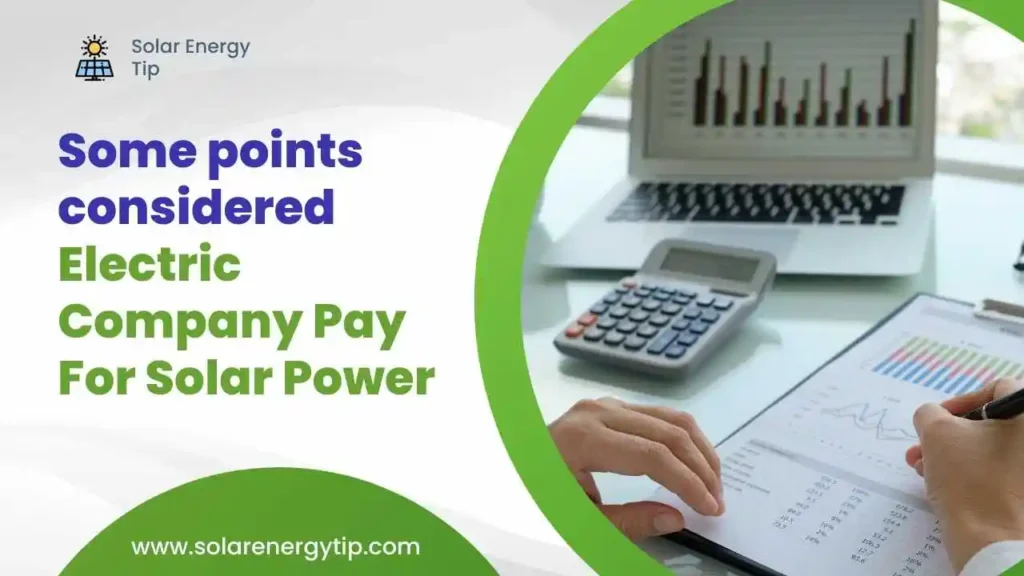
Some points considered are below for how electric utility companies pay you for generating electricity city from your solar panel.
- Compensation depends on your state’s net metering policy – some pay retail rate, others wholesale rate for excess solar sent to the grid.
- Excess power sent to the grid results in a credit on your bill to offset costs when drawing from the grid.
- Some states allow the carryover of excess credits indefinitely, while others expire yearly.
- At the end of the yearly billing cycle, some states will cut you a check for excess credits at a wholesale rate.
- Solar renewable energy certificates (SRECs) can provide additional compensation based on the value of solar in your area.
- Feed-in tariff programs pay a guaranteed rate for renewable energy fed into the grid, but availability varies by location.
- The value of solar energy and compensation rates are active policy issues, so staying updated on your state’s rules is critical.
- Overall compensation can make a significant difference in the finances of installing solar panels.
Net Metering Solar System
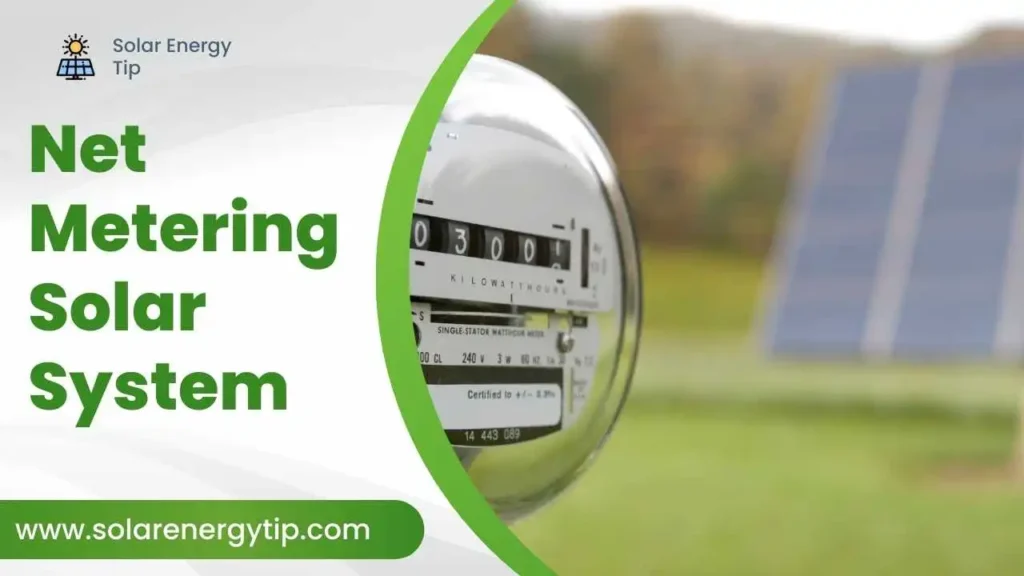
Net metering is also called net energy metering. And if you want to know how much the electric company pay for solar power, it is also very important to know the net metering.
Net energy metering is the practice of submitting a utility bill for the energy generated by a system in which the amount deposited depends on the type of billing.
Thus, the rate of return of solar energy the customer provides to the utility company may vary according to the utility company.
So, let us first get to know what a net meter is.
What Is a Net Meter?
Solar net metering lets you store excess solar energy in the grid, earning credits to offset electricity costs.
Your solar panels send surplus electricity back to the utility company’s grid, banking credits for when you need to draw power.
At night or when solar production is low, you tap into the grid and redeem credits.
The goal is to size your solar array to generate enough yearly electricity to match your home’s needs. With the right setup,
Your panels can produce sufficient power, so your net metering credits zero out utility bills entirely.
Any excess credits get paid back to you. Net metering rewards customers for generating clean solar electricity.
Here is a sample of the best Net Meter you can use in your home for solar net metering.
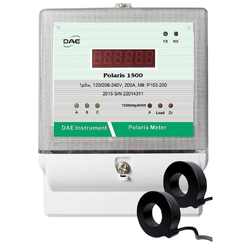
DAE P153-200-S KIT 1 phase 3 wire
(2 hot wire, 1 neutral)
US-compatible items have electrical plugs. Due to power outlet and voltage differences, this item may require an adaptor or converter to use at your destination. Check compatibility before buying.
How Net Metering Works in a Solar Power System?
When some people are not at home to use electricity, their solar energy system usually hits peak electric energy production in the afternoon. There is negligible use of electricity.
In contrast, energy consumption in the home is usually higher in the morning and evening.
That’s why net metering helps you create an account for the ups and downs of your current power generation and consumption.
Electric net metering sends excess solar power to your electric company’s grid. When this occurs, your net operates in reverse.
Your net meter rotates immediately when you draw electricity from the grid when your solar power system isn’t producing enough.
This connection between your solar power system and the utility grid line lets you use excess power to meet your needs.
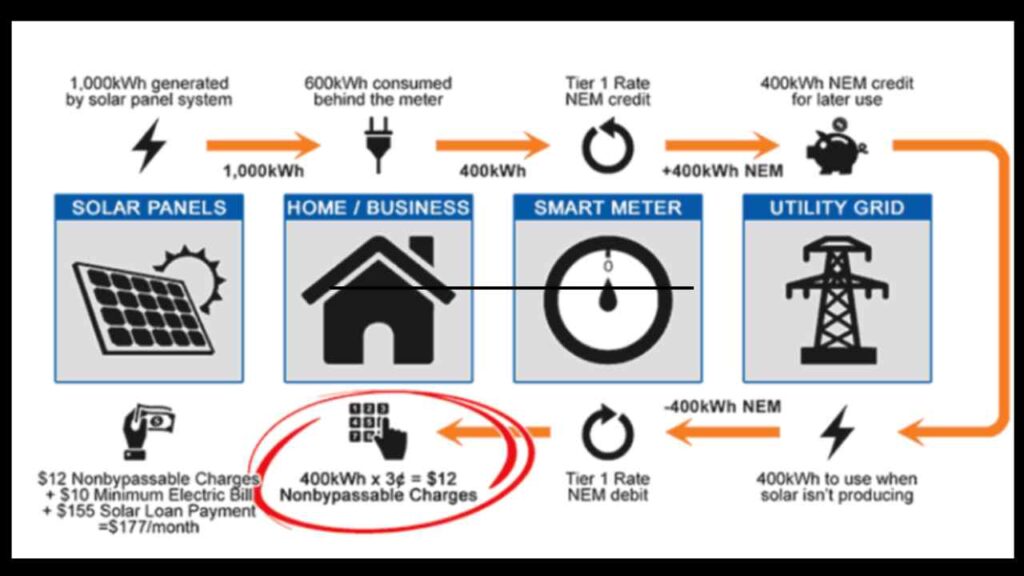
Benefits of Net Metering
There are many benefits to using net electricity metering in a solar energy system, such as…..
- Electricity bills have been reduced.
- Natural energy conserves energy resources.
- Encourages consumers to move towards renewable energy.
- No need to install an expensive battery storage system.
- Take a little pressure from the electric grid.
Analysis of The Potential Drawbacks of Net Metering 👎
Before deciding whether to participate in the program, householders should be aware of a number of potential disadvantages of net metering.
Consider your energy needs and preferences before joining net metering.
Ask your state’s public utility commission and utility provider about local net metering guidelines and whether they suit you.
Net Metering Solar System Price
Prices of net meters used in solar energy systems vary according to their capacity, capacity, and different companies.
Calculating The Compensation
Let’s compute surplus solar power compensation. The details of this computation depend on your area and power company policies. Two ways are typical:
Credit System:
The electric company credits you for each kWh of surplus electricity you generate. Credits can reduce future electricity bills.
The current electricity tariffs determine the value of these credits.
Feed-In Tariffs:
Some regions guarantee a fixed rate for surplus electricity fed into the grid. These government-set prices can stabilize solar installation revenue.
How you earn from Solar Power: See here this video
Can You Sell Solar Energy Back to The Power Company?
In answering these questions, I will tell you that you can sell solar energy to your power company.
Solar energy is an excellent investment since it saves money.
However, business policies and rules determine how the utility company pays for solar energy.
You may be wondering if you can sell the electricity generated by my solar power system to a utility company. Still, it is not, and How much does the utility pay for solar power?
This is an on-grid solar power system, so you benefit by adding credit and controlling your credit utility business for monthly electricity bills.

Selling Solar Power to Generate Income
If you have a solar power system in your home, you may wonder how to sell solar energy.
If you are generating solar power by installing a solar plant on your home or business building, you can sell it to a utility company and generate income.
But you can’t sell it directly to sell energy.
You can sell the extra energy generated after using this solar power system for your home and then sell power back to the grid.
In this way, you can earn income by indirectly selling the solar energy you make. How much does the electric company pay for solar energy?
While most people in California have enough resources to make solar viable, some coastal areas are neglected, assuming you have an excellent resource. Here are some key steps to develop everyone on your property.
The use of solar energy is booming in the United States and around the world.
Policymakers in California and elsewhere have acknowledged this marine change in the price of solar.
Now, many programs are available to landowners to sell solar energy to them in their utility.
Does the Electric Company Pay You For Solar Energy?
Sometimes, an electric utility company pays for solar energy if its customer uses less energy than the electricity generated from its solar system.
Electric utility companies determine how much energy a customer has used in a year.
And understand that if a customer using solar energy uses less electricity in their home than their solar system, then this customer can get their electric bill credit at the end of the year.
How Much is the Average Electric Bill
According to the latest figures released by the Energy Information Administration (EIA), U.S. households typically consume about 10,766 kilowatt-hours of electricity annually.
When you have a solar power system in your home, you may wonder how much the electric company pays for solar power and your average household electricity bill.
So it can be said that the monthly average of the American people is 897 Kwh.
As well as, people from the United States pay 12.57¢ per kWh. Thus, the average American’s monthly electric bill comes to $113.
Thus, utility companies use net meters for what they do based on their solar energy systems, based on America’s average electric bill.
How to Read Electric Bills With Solar
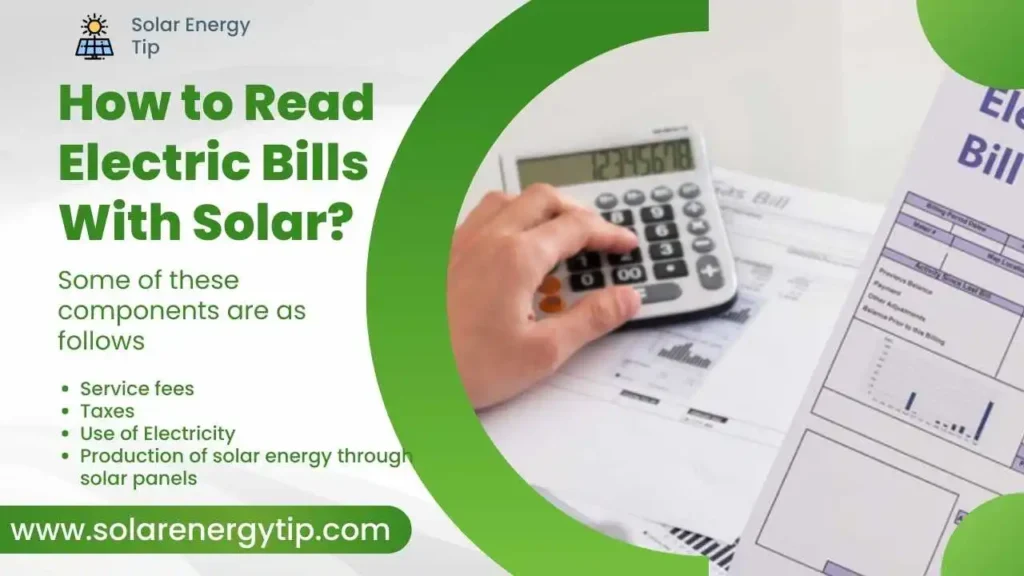
Uses and controls your home’s energy consumption using pure and renewable energy.
Most such electric bills cover some standard components. With a home solar system, such components are usually in the center of the front from which the electric bill is generated. Some of these components are as follows…
- Service fees
- Taxes
- Use of Electricity
- Production of solar energy through solar panels
However, with the solar energy system above your home, your electricity bill includes how many kilowatt-hours of energy you have used from the grid.
That electricity bill does not include how much energy you have used from your solar panels.
Your utility company bill doesn’t even look at how much solar energy you have used, so if you only use the energy generated by your solar panel, the electricity used on your electric bill will be 0.
You will more easily understand how much the electric company pays for solar power.
Electric Bill After Solar Panels
After installing the on-grid solar system, you will get the idea that you will get an electricity bill. In response, I will say yes because anyone expects up to 90% of their electricity bill budget after installation.
If you need 5 kilowatts and have installed a 5-kilowatt system, you can expect up to 90% savings, but if you need 5 kilowatts and have 2 kilowatts, you can expect savings accordingly.
Solar Tax Credit
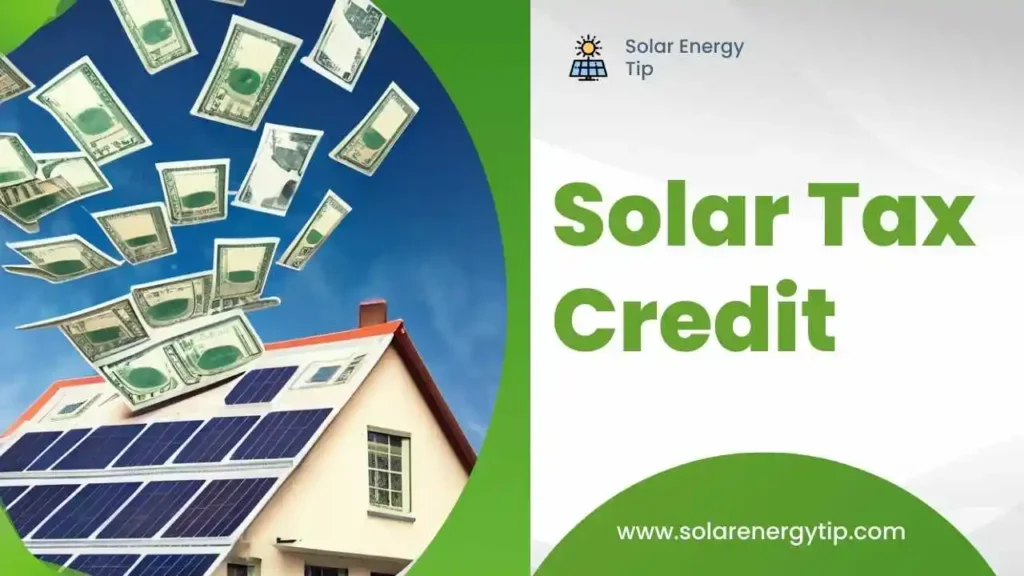
The investment tax credit is also commonly known as a federal solar tax credit.
This allows you to deduct 5% of the cost of installing a solar energy system from your federal tax if you have installed it.
This investment tax credit(ITC) applies to residential and commercial solar power systems and has no cap on its value.
Generally, as long as you have a solar energy power system, you are eligible for this solar investment tax credit.
Even if you do not have a sufficient tax liability to claim full credit in one year, you can roll over the remaining credit in the following year as long as you have implemented the tax credit.
FAQs
Can a house run on solar power alone?
The answer is yes if you can run your home entirely on solar power, Especially in countries where we get a lot of sunshine during the year, it is convenient and beneficial to have a residential and commercial solar system.
You can reap the benefits of a fully solar power system, but it also has some potential drawbacks that are inadvertently linked to it.
The important thing about the electrical energy produced by solar energy is that it is entirely free.
Solar energy is very efficient energy and is pollution-free, but you should keep in mind the possibility of bad weather so that there is no problem with your plan.
Why is my electric bill so high when I have solar panels?
In answer to this question, I can tell you that you may not know, but your home can consume even more energy than you thought.
Do you have a central air conditioner, washing machine, heat pump, or use a dryer frequently? You will remember using more of the above equipment if you have a solar panel.
If you do this, your electricity bill will be higher even if you use solar energy.
How long do solar panels take to pay for themselves?
Depending on your region, your solar panel allows you to pay for your own in 8 to 16 years.
Your location will determine the key metrics when evaluating the value of your installed solar panel.
Factors like these: What solar energy incentives are available to you? How much have you paid and will you pay for energy and distribution, and how much has been developed?
Conclusion
This article details how much electric companies pay for solar power.
We get information about how the net metering system used in the solar system works, its advantages, and the price of the net metering solar system.
To find out how much the electric company pays for solar power, we can sell solar energy to a power company, as well as generate income from selling solar power.
We also get information about how the electric company reads the electric bill with the solar system and the solar tax credit.
I hope the information I have given in this article will be very useful.
Have a nice day, Good Bye… 🙂

